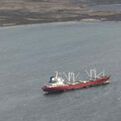
Britain and the Falklands Powder Keg
A crisis is brewing in the South Atlantic—a crisis that friendless, powerless Britain is ill equipped to survive.
On December 10, a Chinese diplomat visiting Buenos Aires ratified support for Argentina’s sovereignty claim over the Falkland Islands. Less than two weeks later, Argentina successfully petitioned its neighbors in the trading bloc Mercosur (which includes Brazil, Argentina, Paraguay and Uruguay) to show their support of Argentina’s claim on the islands by closing their ports to any and all ships flying the Falklands’ flag.
Both developments, two among many, reveal the growing support Argentina has in its claim on the Falklands.
As China and Latin America throw their weight behind Argentina, Britain is losing friends willing to support its sovereignty in the Falklands. Most notably, U.S. President Barack Obama has refused to back Britain’s right to the Falkland Islands and has instead supported Argentina’s calls for negotiation at the United Nations. After what happened earlier this month in Brussels, it’s unlikely Europe would take up Britain’s cause—let alone give it political or military support—should a crisis break out in the South Atlantic.
Britain, it seems, is on its own to defend the Falkland archipelago.
Meanwhile, Argentina continues to push its case—in the region, in Asia, and at the UN and in other international bodies. Argentina’s National Congress is considering a proposal that would make the country’s official Olympic logo the image of the Falkland Islands with the words “The Falklands are Argentine.” Over the past couple of months, Argentine patrol ships have boarded Spanish fishing boats, saying their fishing licenses are not valid and that they are operating “illegally” in disputed waters.
All these developments beg the question, why is Buenos Aires making such an effort to garner international support for its claim on the Falklands? Is it laying the diplomatic groundwork in anticipation of a conflict with Britain?
Rockhopper Exploration, a British energy company, has been exploring oil reserves around these islands for most of this year. Its shares have reached a peak price 10 times higher than their previous level because of this oil exploration. It is still too early to tell exactly how much oil lies beneath the Falkland Island seabed, but Western energy companies are investing a great deal of time, money and hardware in the search. Of course, Argentina boils with anger at the possibility of the Falklands becoming an energy source for Britain.
If Britain sanctions large-scale drilling of oil in the Falklands, it could provoke a dramatic response from Argentina.
If such a moment comes, one wonders how Britain would react to such Argentine aggression. The archipelago has been a vital strategic asset of Britain’s since the early 19th century, giving the British an important outpost in Drake Passage, the sea-lane that connects the South Atlantic and South Pacific oceans. Prime Minister Margaret Thatcher was aware of the strategic and symbolic importance of the Falklands to Britain, which is why she responded with terrific force when they were threatened in 1982.
Be assured, sooner or later Argentina will once again test Britain!
Yet while Argentina is upping the ante, Britain is slashing its navy. The simple fact is, Britain could not reclaim the islands on its own, and it is losing allies fast. Britain’s navy is nowhere near its 1982 strength. “It is highly unlikely that Britain could repeat the mission,” wrote the Telegraph, “particularly since we no longer have an aircraft carrier available.”
“This … is a dangerous moment to be making cuts to the Royal Navy,” writes British mep Daniel Hannan. “We now know that the withdrawal of hms Endurance from the South Atlantic tempted [Argentine Gen. Leopoldo] Galtieri to think that an invasion would not be contested. In theory, of course, it would no longer be necessary to recapture the islands, since we have sufficient forces there to defend them. Still, warfare is as much about willpower as weaponry.”
As mentioned above, it seems that Britain the next go around will not have the support of America. “Where [Ronald Reagan] saw an English-speaking democracy threatened by a neighboring dictatorship, Barack Obama, who is obsessed by his father’s ’50s anti-colonialism, sees a leftover from an empire whose memory he detests,” writes Hannan. “His administration has backed Argentina’s demand for talks on sovereignty, and has taken to calling the islands by their Argentine name, Las Malvinas.”
Regardless of how the exact course of events plays out, when Britain’s test in the Falklands comes, Bible prophecy says that London will lose control of this strategic asset. You can read the prophecy in Deuteronomy 28:52. In fact, it wouldn’t be surprising if these islands eventually fall, either directly or indirectly, under the influence of continental Europe—especially if they emerge as a source for energy. European leaders are out for revenge against David Cameron for vetoing a proposed fiscal pact designed to give Germany near-complete control over Britain’s financial service sector.
If Britain cannot defend the Falkland sea gate, don’t be surprised if a German-dominated European trade bloc moves in and takes the Falkland Island oil reserves for itself—possibly via some sort of bilateral treaty with the Argentine government. Relations between Buenos Aires and Berlin have been strong historically. Whatever happens, however, it is important to keep an eye on the South Atlantic.
Britain’s Falklands test is coming—quite possibly in 2012.
